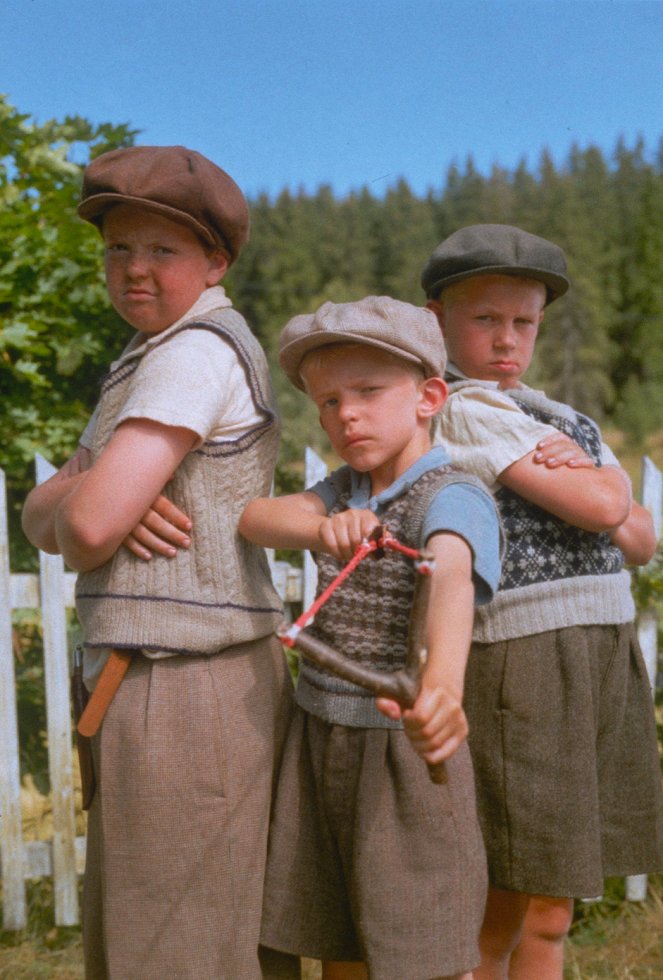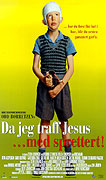Réalisation:
Stein LeikangerPhotographie:
John Christian RosenlundMusique:
Randall MeyersActeurs·trices:
Fredrik Stenberg Ditlev-Simonsen, Martin Eidissen, Frederick Paasche, Grethe Bøe-Waal, Gard B. Eidsvold, Otto Jespersen, Steinar Sagen (plus)Résumés(1)
The film is a series of humorous and touching vignettes, covering the years from 1936-1939 -- all with little Oddemann, a five to seven year old who is in serious doubts about the value of becoming a grown-up. Several of the episodes in the film have short commentaries by Odd Børretzen, now in his mid-seventies, Norway's beloved Jazz poet and radio-voice. The young Oddemann is Odd Børretzen as a child, and it is his childhood experiences we are seeing.
Oddemann lives on a small farm outside Oslo - and doesn't know much about the world outside. Yet, this outside world keeps intruding on his isolated idyll, and each intrusion brings him a step closer to the realities of the adult world. The film opens with the preparations the small village must undertake in the event of air-raids. The military is about to demonstrate its air defense of Oslo, and all households must build shelters. The grown-ups have understood that they are going to have to prepare for the worst. The officials in the small community gather everyone to brief them about how to get ready for possible air-raids, and the two families on the farm build a common air-raid shelter. The first time they use it, they run inside, only to discover they should have brought a light, and some water, and biscuits, and maybe a deck of cards - but grandmother vetoes the cards, finding it unseemly to be playing cards "when there is a war going on." The protagonists go to a small hill next to the farm, to watch a display of anti-aircraft fire - the authorities want to instill confidence in their ability to defend Norway against attackers - and have promised that there will be an impressive display of the guns placed around Oslo.This actually happened, on the eve of the German invasion of Poland. As they watch the anti-aircraft fire, a sense of dread and worry settles in - and Oddemann wonders what this all could mean, now that the military are shooting live ammunition at Heaven. Do the angels have to run for cover as well, when they hear the air-raid siren? And what about Jesus - is he safe? He has to ask father: "Father? I was wondering... is Jesus bullet proof?"
We then move into the events that go before this episode on the eve of the anti-aircraft fire - as we discover what has happened in Oddeman's life to give him his skeptical attitude about the world of the grown ups. Oddemann goes to the country store, where he meets a group of unemployed grumblers that are regulars on the bench outside the store - they reappear at intervals in the film, adding humorous confusions to Oddemann's naive understanding of the world of the grown-ups.
The war between Italy and Ethiopia is in the news, and the kids love to play Ethiopians fighting against the Italians - poor Oddemann gets to be Italian, of course, and is an easy victim to the wily Ethiopian tribesmen, in the guise of his older Brother, who knows everything and decides everything, and his best friend, Kristian, who lives in the other house on the farm.
Oddemann has a magic clock - and he is the only one who knows it is magical. He likes to listen to the tolling bells of the clock, and he loves running around the farm, announcing the time to everyone he meets. The clock is important in the film - during the introduction, Oddemann has told us that he's not exactly certain 'When' he left the world of his childhood, though he knows when he entered it to the minute. The clock knows, however, it's actually going to break down at the very instant when Oddemann leaves the world of his childhood.
But that's still a way off - Oddemann's father returns, and they all go to church. The priest has the peculiar habit of singling out a sinner in his congregation, for special attention during Sunday sermon - and Oddemann's brother, who must have committed some unmentionable sin, is always very nervous about these church visits, hoping the priest will pick someone else as subject for a fire and brimstone sermon. The family goes to church, and to the brother's relief, the priest has chosen to talk about a local sheep-thief and not about Brother - but then Oddemann asks whether his brother is safe now, loud enough for everyone to hear - and the priest zeroes in on Brother - who promptly faints, and is carried away from the church. The embarrassment keeps the family away from church for good, to the brother's unending relief.
Kristian's mother and father are true Bohemians, with the father being a theatre impresario and the mother a renowned actress. They often have their Bohemian friends coming over, to party. Oddemann's mother is not comfortable with this - given her religious upbringing - but she and his father do go to one of these parties - but it doesn't end well. The actress pulls a practical joke on mother - when mother wonders what a long and dark object in the window-sill could be. The actress tells mother to bring it with her outside and ask her husband. Mother does so - and ends up in front of thirty people asking what "this could be?" It turns out to be a whale-cock, and everyone has a good laugh at mother's expense. This makes mother hate the actress, and she does all she can to avoid her in the future.
There's a lot to be afraid of besides self-righteous priests in Oddemann's world - there's a strange man everyone says must be crazy, who walks aroundchanting about dangerous times. The kids believe he struck his head once, and this made him crazy - Oddemann worries no end when he falls down and strikes his own head against a stone - he ends up with a large bandage around his head. Kristian lectures to the kids about the dangers of bumping your head against things if you want to remain "normal". Oddemann doesn't know about the trouble brewing in Europe, which will eventually reach his little idyll. But there is more than enough going on just around the corner.
On the radio, there is a report about people in another hamlet having seen Jesus, and Oddemann decides he wants to have a shot at an observation of his own - literally. He knows, from the Bible, that not even the smallest sparrow falls to the ground without Jesus seeing it - which is why he and his brother and Kristian decide it's a good idea to shoot a sparrow, and to pay close attention as it falls - since that must be a very good time to keep your eyes open if you want to see the Lord. They do shoot a sparrow with a catapult, but all they get to see is a hawk, which comes out of the skies in a flash to claim the wounded bird. When they try to shoot the hawk, the sling shot breaks, the rubber snapping against Kristian's face. This has Oddemann wonder whether the hawk could have been Jesus in disguise - and the sling shot breaking could be the Lord's doing. Jesus does work in mysterious ways...
Oddemann's conscience has a hard time after the killing of the sparrow - and he decides he must atone for his sin. He gets his mother to go with him to the camp of the tunnel workers. The workers are very poor, and having made sure that he and his family are not the poorest people around, Oddemann believes he'll get some points Up there by going to the workers with some food and blankets. On their way there, Oddemann reflects on something the regulars at the country store have told him - that the Worker's Party wants to sell Norway to the Russians. And Oddemann pays close attention when they reach the camp, in the hope of seeing where all the wrapping up of Norway is taking place. There's not much evidence of such activity at the camp - but he does get to ease his conscience just a little bit when the gift are handed over to the poor.
Spotting Jesus is difficult in Norway - Oddemann studies a lot of illustrations, and finds out that Jesus is not dressed for Norway's climate - sandals and a toga is not really the thing in Winter. Instead, he and Brother and Kristian set out for the North Pole, when Brother gets a compass for Christmas. The needle pointing towards North is irresistible - and the boys set out, with Oddemann being the sled-dog, since there were only two Norwegians, Nansen and Johansen, on the original trip North. The journey starts off well - but then a storm surprises them, and they lose their bearings when Brother drops the compass in the snow. The boys are saved in a miraculous way - Beisebeisa, the former factory owner, having a part in their rescue.
We leave Oddeman's world after the storm - as the originator of the story, Odd Børretzen, reflects on the curious fact that during his life, he has been on every continent of the world, even to many places he intends to revisit - yet, he cannot return to the world of his childhood, neither as explorer or tourist - this world disappeared at the very instant he grew beyond it...
The film is a humorous tribute to the life spirit of children and families everywhere - set in an age that maybe seems simpler to our "sophisticated" eyes - yet they also had their troubles, which had to be solved through friendship and togetherness. (texte officiel du distributeur)
(plus)Photos (6)
Photo © Nordic Screen Production AS
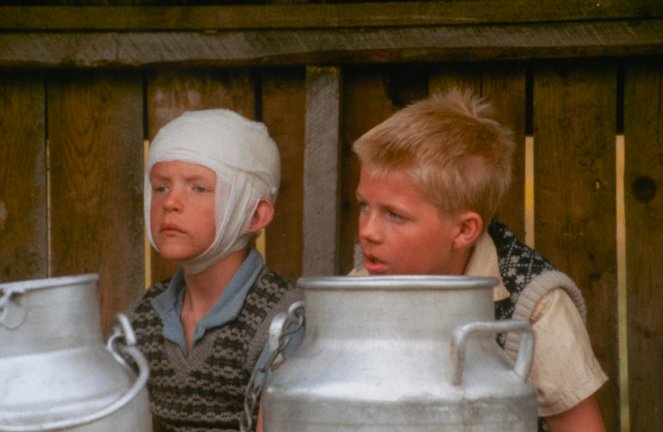
Photo © Nordic Screen Production AS
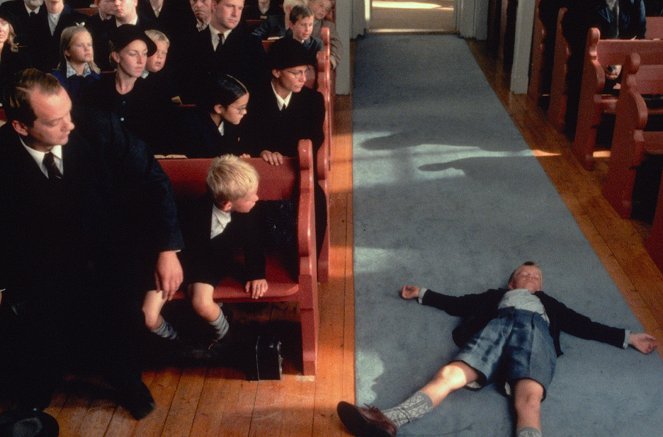
Photo © Nordic Screen Production AS
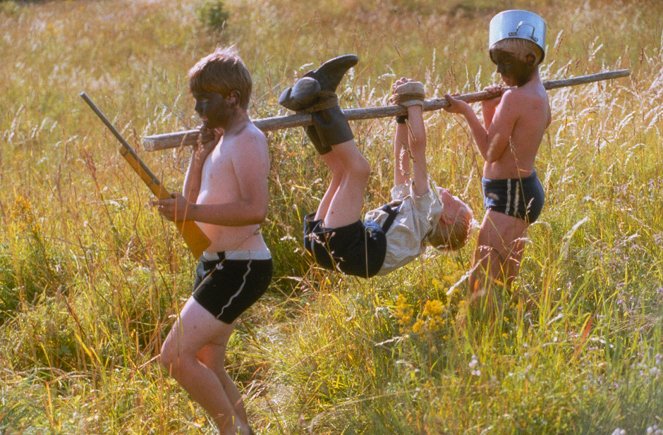
Photo © Nordic Screen Production AS
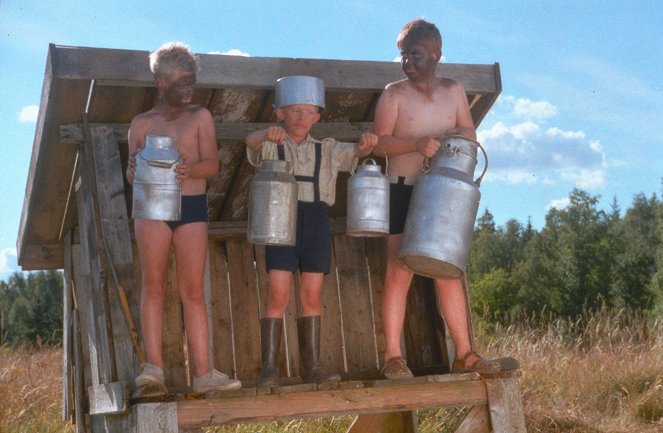
Photo © Nordic Screen Production AS
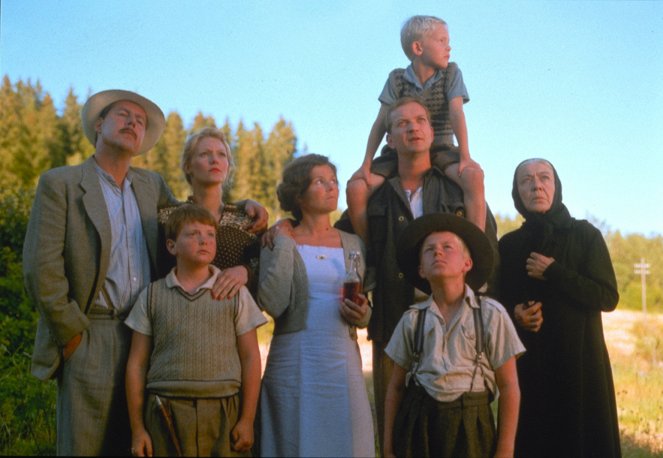
Photo © Nordic Screen Production AS
